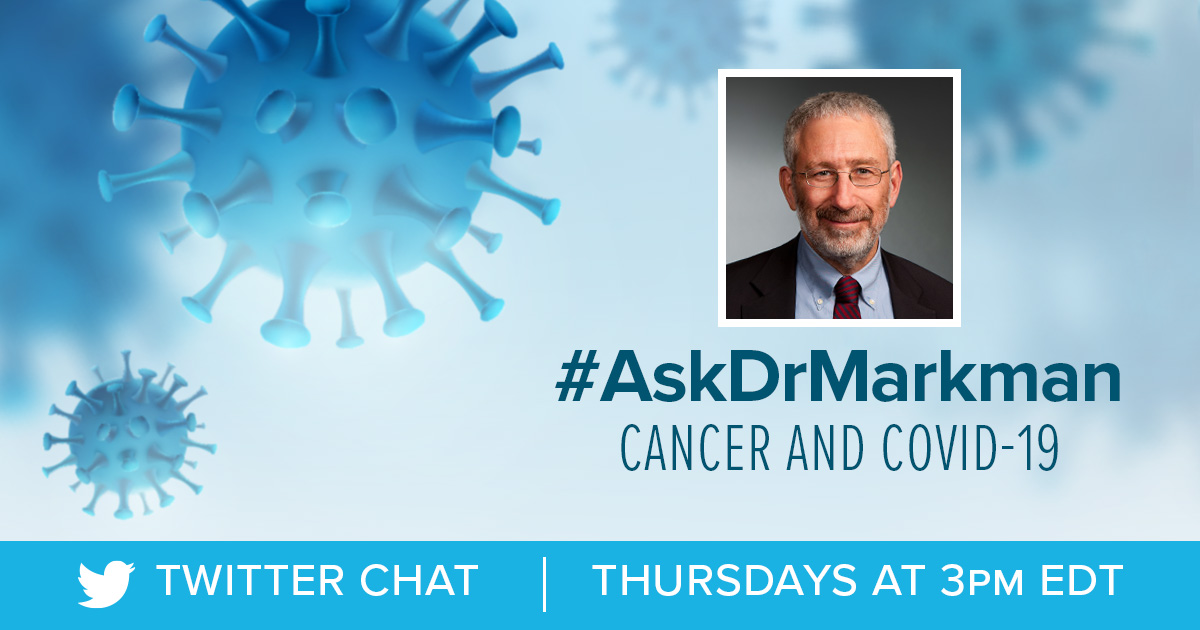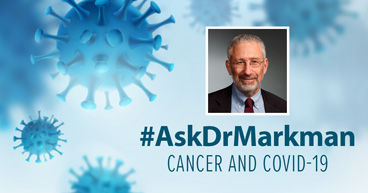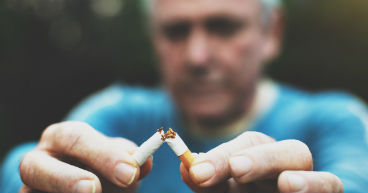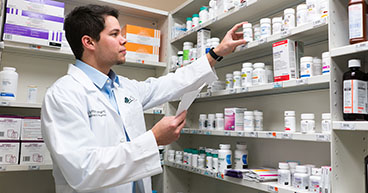
The COVID-19 pandemic has created a constantly evolving flow of new and sometimes confusing information. Cancer patients have many questions about how the virus may affect them, their access to ongoing treatments, their overall health and steps they can take to help reduce risk of infection. Maurie Markman, MD, President of Medicine & Science at Cancer Treatment Centers of America® (CTCA), has launched a weekly Q&A hosted on Twitter to answer your questions, in real time and as questions are sent to us online and by phone. Follow us on #AskDrMarkman. Here’s this week’s chat:
Question: I have been undergoing cancer treatment for eight years, and I am also being treated for HIV. Is there any evidence the drugs I’m taking for HIV also are effective treatment for COVID-19?
Answer: There has been considerable interest in the possibility that one or more of the drugs currently used to treat HIV (human immunodeficiency virus) may be useful against COVID-19. However, to date, there’s no clinical trial evidence to support this suggestion, and a recent randomized trial from China examining the combination of lopinavir/ritonavir in a laboratory-confirmed COVID-19 infection failed to demonstrate any evidence of benefit.
Q: As a cancer patient, I am concerned with being around people who may have COVID-19 and not know it. How common is it for someone to have no symptoms and still be able to infect others?
A: This is a very important question. Data continues to be accumulated from a number of sources to provide a more definitive answer. A recent summary of reported experiences suggests that as many as 45 percent of COVID-19 infections may be completely asymptomatic, emphasizing the need for both social distancing and the widespread use of face masks.
Q: My sister is undergoing cancer treatment, and her friend suggested she consider a diluted solution of a household cleaner to reduce the risk of COVID-19 infection. Do people really believe this is actually safe? It sounds terribly dangerous to me.
A: You are 100 percent correct that this suggestion is extremely dangerous and should under no circumstances be used to prevent a COVID-19 infection. Unfortunately, there is evidence that a substantial percentage of the population is under the terribly mistaken and dangerous belief that such products are safe and potentially beneficial. A recent U.S. Centers for Disease Control and Prevention (CDC) internet survey, for example, found that one-third of those surveyed said they “engaged in non-recommended high-risk practices with the intent of preventing COVID-19 transmission,” including using bleach on food products, applying household cleaning and disinfectant products to skin, or inhaling or ingesting cleaners and disinfectants.”
Q: As a cancer survivor and a former cardiac patient, I am looking for good news regarding potential treatments for serious COVID-19 infections? Is there anything to report?
A: There are currently a large number of clinical trials exploring a variety of potential options to treat a serious COVID-19 infection. Recently, a preliminary report from investigators in Great Britain identified dexamethasone, a widely used and inexpensive steroid, as showing impressive promise in reducing the risk of death in COVID-19 patients requiring use of a ventilator.
Q: My father is being treated for prostate cancer, and his physician told him that if he contracted COVID-19, plasma from a recovered patient may be beneficial for him. Is this true?
A: Extensive, ongoing research is studying the potential role of blood products containing anti-COVID-19 neutralizing antibodies in reducing the severity of infection from the virus. Small studies suggest the potential benefit of this approach, and the scientific community is awaiting the results of more definitive trials with considerable interest. A recently reported Mayo Clinic study that examined the transfusion of blood plasma from recovered COVID-19 patients has offered important evidence that this approach is safe.
Q: I take seriously the advice to shelter in place due to my cancer. My wife works a full-time job. What precautions can we take to limit the chance she might bring the virus home?
A: It’s a very important question. It’s especially important that your wife is careful, which means she should always wear a mask at work and in public, maintain social distancing wherever possible (6 feet apart), and wash her hands carefully when appropriate.
Q: My mother, a 30-year cancer survivor, is in a nursing home. Fortunately, there have been no cases of COVID-19 so far. If infection is found in a nursing home, do all who live there and who become infected develop symptoms?
A: Nursing homes have been particularly hard hit by the COVID-19 pandemic, with the risk heightened by close living quarters, the age of nursing home residents, and the high likelihood that these residents have a number of co-morbidities. However, a recent detailed study that examined a COVID-19 outbreak in a Chicago nursing home found that 37 percent of those infected had no symptoms.
Q: I have had to postpone my visit to my oncologist several times over the past month due to the COVID-19 pandemic? Are other cancer patients delaying their visits, too?
A: Yes. Oncology practices around the country have reported the frequent need to reschedule appointments and to conduct many appointments by telemedicine. And this is not unique to cancer patients. A recent survey involving 1,700 respondents (not oncology-specific) found that 75 percent were required to change their normal health care practices due to COVID-19, with 11 percent noting a shortage of a required prescription drug.
Q: I am a 20-year breast cancer survivor and, over the years, I have had frequent experiences with the flu. Does this provide me with any protection from COVID-19?
A: There’s currently no evidence that prior infection with the “flu virus” provides immunity to a COVID-19 infection. However, researchers are actively investigating whether prior infection with a different type of coronavirus may reduce the risk of a serious COVID19 infection.
Q: I am 52 and a 10-year cancer survivor. Based on my age and health history, what is my relative risk dying from COVID-19 if I’m infected compared to those who are much older than me?
A: Accumulating evidence continues to suggest that the very elderly (over the age of 80) are at higher risk of dying from a COVID-19 infection, accounting for 80 percent of deaths, according to several reports. Depending on the study, individuals under the age of 65 accounted for less than one-quarter of all COVID deaths. Since you are a long-time survivor (and congratulations on that!), your cancer history does not increase your risk of complications from COVID-19.
If you’re a cancer survivor or in active treatment and are concerned about how COVID-19 may impact you or your care, please contact your care team.
Learn more about staying healthy while staying inside during the pandemic.



